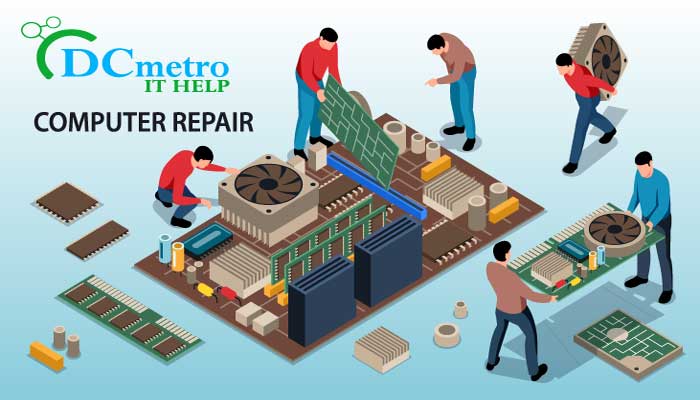In today’s technologically driven world, computer systems play a vital role in almost every aspect of our lives. From personal computers to complex network infrastructures, the smooth functioning of these systems is essential for individuals, businesses, and organizations. Behind the scenes, computer technicians are the unsung heroes who ensure that these systems remain operational, secure, and efficient. In this article, we will delve into the role of a computer technician, exploring their responsibilities, skills, and the value they bring to the digital age.
Contact us 202-810-7755 today to learn more about Computer Technician. Please contact us to Computer Technician for your business or if you have any questions or concerns.
DC Metro IT Help
Responsibilities of a Computer Technician:
Computer technicians, often referred to as IT support specialists or help desk technicians, are responsible for diagnosing, repairing, and maintaining computer systems and networks. Their role encompasses a wide range of responsibilities, including:
- Troubleshooting: Computer technicians are skilled problem solvers who identify and resolve technical issues. They analyze symptoms, run diagnostic tests, and employ their expertise to determine the root cause of problems.
- Hardware and Software Maintenance: They perform regular maintenance tasks such as installing operating systems, upgrading hardware components, applying software patches and updates, and configuring peripherals to ensure optimal system performance.
- Network Support: Computer technicians assist with network setup, configuration, and troubleshooting. They ensure that network connections are secure, troubleshoot connectivity issues, and implement network protocols.
- Data Backup and Recovery: They create and implement data backup strategies to protect valuable information from loss or corruption. In the event of a system failure, computer technicians employ their knowledge to recover lost data and restore systems to a functional state.
- User Support and Training: Computer technicians provide user support by addressing queries, resolving software or hardware issues, and offering guidance to individuals who may not be tech-savvy. They also conduct training sessions to enhance users’ understanding of computer systems and applications.
Skills Required:
Being a computer technician requires a diverse skill set, as they need to be proficient in both technical and interpersonal aspects. Here are some key skills necessary for success in this role:
- Technical Knowledge: Computer technicians should have a strong understanding of computer hardware, operating systems, networking protocols, and software applications. They must stay updated with the latest technology trends and developments.
- Troubleshooting Abilities: An analytical mindset and problem-solving skills are vital for identifying and resolving technical issues efficiently. They must be able to think critically and apply logical reasoning to troubleshoot problems effectively.
- Communication Skills: Strong communication skills are essential for explaining technical concepts to non-technical users, understanding user issues, and collaborating with colleagues and clients. Active listening and clear articulation are crucial for effective communication.
- Time Management: Computer technicians often handle multiple tasks simultaneously. Excellent time management skills enable them to prioritize tasks, meet deadlines, and provide timely solutions to users.
- Adaptability: Technology evolves rapidly, and computer technicians need to adapt to new hardware, software, and emerging technologies. Flexibility and a willingness to learn are essential qualities in this field.
Value in the Digital Age:
Computer technicians play a crucial role in the digital age by ensuring the smooth operation of computer systems and networks. Their expertise and support help individuals and organizations leverage technology effectively. Here are some key ways computer technicians add value:
- Increased Productivity: By promptly resolving technical issues and providing ongoing maintenance, computer technicians minimize downtime, enabling users to work efficiently and boosting productivity.
- Enhanced Security: Computer technicians implement security measures to protect systems from cyber threats and unauthorized access. They educate users on best practices for data protection, minimizing the risk of breaches and information loss.
- Cost Savings: Proactive maintenance and timely repairs carried out by computer technicians can extend the lifespan of computer systems, reducing the need for frequent replacements and saving organizations money.
- User Empowerment: Computer technicians empower users by offering training and guidance. Their patient and user-friendly approach helps individuals develop confidence in using computer systems, increasing their digital literacy.
In the age of digital transformation, computer technicians are indispensable professionals who ensure the smooth functioning of computer systems and networks. Their expertise in troubleshooting, maintenance, and user support plays a vital role in keeping technology accessible, secure, and efficient. As technology continues to advance, the role of computer technicians will only grow in importance, reinforcing their position as essential contributors to the digital age.



Leave a Reply